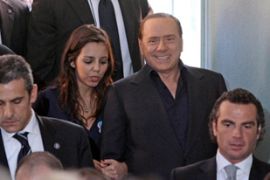Italians vote in regional polls
Low turnout in elections set to threaten Berlusconi’s governing centre-right party.

It will be an uphill task for Berlusconi, whose approval ratings have sunk over a year in which he has been dogged by scandal in his private life and corruption investigations linked to his media empire.
“These are local elections, but they have been transformed by Berlusconi into a referendum on his government,” Guido Moltedo, a political commentator from the Italian Europa newspaper, told Al Jazeera.
Bureaucratic bumbling
Berlusconi’s party too has been beset by embarrassments, not least the arrest in February of several PDL members accused of accepting kickbacks.
Soon afterwards the PDL fumbled over its candidate lists in Rome’s Lazio region and Berlusconi’s native Lombardy.
Also in March, prosecutors opened a probe into allegations that Berlusconi tried to gag a political talk show that often criticises him.
National broadcasters suspended their political programming before regional elections, saying they did not want to be seen favouring any one party, but also to avoid fines for bias.
Even so, Rai television, which groups all public channels, was still not able to avoid a fine.
Its main television news programme was hit with a fine the equivalent of $134,000 for “imbalance” in reporting and “weak” coverage of the smaller candidates.
Regional elections
About 41 million Italians are eligible to vote in the elections for governors of 13 of the country’s 20 regions, as well as heads of four provinces and nearly 500 town halls.
Eleven of the regions are currently controlled by the centre-left opposition, which has also been in disarray since it was defeated by Berlusconi in the 2008 national election.
|
|
| The beautiful nature of Italy’s regional polls |
The centre-left is seen as likely to hold on to at least five regions, four of them in its traditional central heartland – Emilia Romagna, Tuscany, Umbria, Marche – and Basilicata in the south.
Four other regions – including Piedmont and the key Lazio region which contains Rome – are too close to call.
The Italian prime minister has denied that he is facing any threat from his coalition partners, the populist and anti-immigration Northern League, which analysts say could make gains in the regions of Lombardy and Veneto.
Umberto Bossi, the party’s leader, said in an interview last week that it would be “fairly logical” for the Northern League to do better than the PDL in Veneto and Piedmont.
Our correspondent said Bossi’s party was likely to benefit from Berlusconi’s problems.
“There are one or two million centre-right voters according to the latest polls who have been disillusioned with Bersluconi’s party. They want to stay on the right so are more likely to vote for Bossi,” Lavanga said.
Possible alignments
If the Northern League does make major gains it is likely to demand a new cabinet post and city hall in Berlusconi’s native Milan, Italy’s economic and financial capital.
A resurgent Northern League could also further alienate a key Berlusconi ally, Gianfranco Fini, the parliament speaker, often tipped as a successor to the three-time prime minister.
Fini, whose southern-based National Alliance merged with Berlusconi’s party last year, has been increasingly critical of the government, and there is some speculation that he may decide to recreate his own political force.
In the lead-up to the election, Italy’s postal service intercepted a threatening letter containing a bullet addressed to Berlusconi, police said.
A large envelope containing the threat “you will end up like a rat” was discovered on Friday in a post office in the Libate suburb of the northern city of Milan, police said.